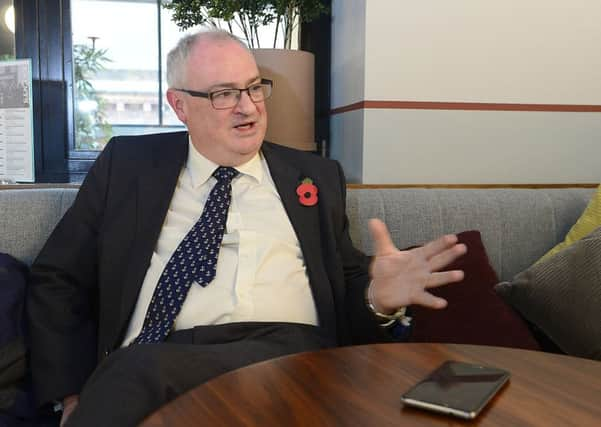Pressure on Nigel Dodds as new UUP leader rules out standing aside


Mr Aiken, who as the only candidate for the leadership will formally succeed Robin Swann as UUP leader in a fortnight, said that his party will stand in all 18 Westminster constituencies, unlike the situation int he last two General Elections.
In an interview with the News Letter yesterday, Mr Aiken also set out a series of areas in which he will change the party, but stressed that he would not do away with the party’s conscience votes for members in areas such as abortion.
Advertisement
Hide AdAdvertisement
Hide AdThe former commander of a Royal Navy nuclear submarine said that he wanted “to get the Ulster Unionist Party to a position where it can represent...solid British values”.
He said that 21st century liberal Britain is “a very attractive place to be” and that is one of the reasons why so many people from the island of Ireland who go to Britain for university like it and stay.
The Ballyclare man said: “That in many ways is quite absent in Northern Ireland at the moment amongst a particular grouping; actually what we need to do in Northern Ireland is get that sense of Manchester, Liverpool, whatever it is, and use that to secure the Union”.
However, he was scathing about the DUP, particularly in relation to its record at Stormont and the mess of the Brexit negotiations.
Advertisement
Hide AdAdvertisement
Hide AdTwo years ago, the UUP insisted that it had not entered a formal pact with the DUP but made what it described as a “unilateral decision” not to stand in North Belfast and instead backed the DUP. The DUP in return did not stand in Fermanagh and South Tyrone, backing the UUP.
In the General Election before that, in 2015, the party was open about the fact that it had struck a deal with the DUP not to challenge each other in certain seats.
However, when asked if the UUP would stand aside for the DUP in some seats, Mr Aiken bluntly and emphatically told this newspaper: “No. We’re not standing aside. We’re going to fight all 18 constituencies.”
Asked if he would regret his decision to run 18 candidates if it was to cost someone like Nigel Dodds his seat, Mr Aiken said: “Nigel Dodds and the DUP made it very clear, time and time again, that they don’t need Ulster Unionist support and we didn’t put a border down the Irish Sea; Nigel Dodds needs to answer that question.” Mr Dodds, the DUP’s Westminster leader and one of its most capable figures, is its most electorally vulnerable MP.
Advertisement
Hide AdAdvertisement
Hide AdIn 2017, even with the UUP standing aside, Sinn Fein was just 2,081 votes behind the DUP deputy leader.
The last time when the UUP stood in the constituency was two years ago when in the Assembly election Robert Foster, a low-profile candidate, polled 2,418 votes.
However, since then the UUP’s vote has fallen across Northern Ireland and Westminster elections traditionally invovle tactical voting for one of the candidates who is capable of winning, so the UUP’s vote would likely be much lower than that in the forthcoming election. The Sinn Fein candidate, John Finucane, is Belfast’s Lord Mayor and has significantly raised his profile since last standing against Mr Dodds.
Mr Aiken is still new to politics, having first been elected to any political post when he entered the Assembly as an MLA just three-and-a-half years ago. The South Antrim MLA’s decision not to pursue even a limited pact will not be welcomed by some UUP members and supporters but indicates that he is prepared to take risks in attempting to turn around what has appeared to be the unending decline of the UUP over the last two decades.
Advertisement
Hide AdAdvertisement
Hide AdThe UUP supported Remain in the EU referendum – although its members were divided –but then adopted the stance that it accepted the will of voters to leave the EU and the result must be implemented.
Mr Aiken, however, said that the way in which the UK chooses to leave must not involve any fresh checks in the Irish Sea or at the Irish border, which “in effect means something much closer to the Customs Union”.
He said that at present Brexiteers in Northern Ireland faced a poor choice – either a deal which is not really Brexit for Northern Ireland, or keeping the UK together at the expense of their desire for the whole UK to leave the EU.
Referring to the DUP’s recent U-turn to back a regulatory border in the Irish Sea, Mr Aiken said: “I cannot understand for the life of me – and I know we joke about ‘jot and tittle’ and Arlene and [DUP chief executive] Timmy Johnston not being all over the detail – but how did we ever get in a situation where the DUP, the supposed supporters of the Union, have been one of the biggest detractors from it and through the agreement to put a border down the Irish Sea have created a place apart? That is extraordinary.”
Advertisement
Hide AdAdvertisement
Hide AdMr Aiken, who made clear that he was pragmatically in favour of the EU rather than being enthusiastic about Brussels, said that the UUP needed to provide an alternative because “at the moment if you are voting unionist...the only thing you’re in essence supporting is Brexit”
Mr Aiken said that the UUP would either back a form of Brexit which did not damage the Union, or, if that is not possible, then remaining in the EU in order to preserve the Union.